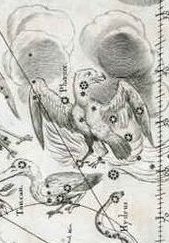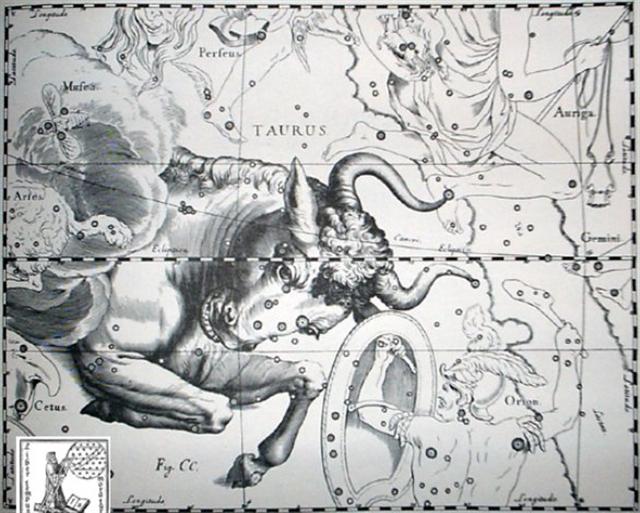With the final of 'Raven' at the beginning of side a we can guess the first 2 glyphs belong at the end of side b:
| 'Februarius 21 |
22 (51) |
23 (Terminalia) |
| no glyph |
 |
 |
| Ca1-1 |
Ca1-2 |
| koia |
ki te hoea |
| Al Fargh al Thāni-25 / Uttara Bhādrapadā-27 / Wall-14 |
χ Pegasi (340.4), θ Andromedae (341.0) |
| Caph, SIRRAH (338.8), ε Phoenicis (339.1) |
ALGENIB PEGASI (340.0) |
| Alchita, Ma Wei (156.1), Minkar (156.7), ρ Centauri (156.9) |
Pálida (157.6), Megrez (157.9) |
Hasta-13 / Chariot-28 |
| GIENAH (158.1), ε Muscae (158.2), ζ Crucis (158.4), Zaniah (158.9) |
Then there could follow 5 days 'when Gods were born':
| 24 |
25 |
26 |
27 |
28 |
 |
 |
 |
 |
 |
| Ca1-3 |
Ca1-4 |
Ca1-5 |
Ca1-6 |
Ca1-7 |
| ki te henua |
te rima te hau tea |
haga i te mea ke |
ki te henua - tagata honui |
te ika |
| ζ Tucanae (341.7), π Tucanae (341.9) |
no star listed |
Ankaa, κ Phoenicis (343.2)
Alphard
|
λ Phoenicis (344.5), β Tucanae (344.6) |
no star listed |
| Chang Sha (159.3) |
Intrometida (160.4), Acrux (160.5) |
γ Com. Berenicis (161.0), σ Centauri (161.1), Algorab (161.5), Gacrux (161.7) |
γ Muscae (162.0), Avis Satyra (162.3), Asterion (162.5), Kraz (162.7)
Alderamin
|
α Muscae (163.2), τ Centauri (163.5), χ Virginis (163.7) |
The figures at left in Ca1-3 and Ca1-4 have hanging 'fruits' (offspring) in front. Henua ora is open at the top and hau tea open at bottom - earth respectively sky:
 |
 |
| henua ora |
hau tea |
 |
 |
| Ca1-3 |
Ca1-4 |
The central vertical straight lines in henua ora and hau tea is their common denominator:
... In the beginning were Rangi and Papa, Sky and Earth. Darkness existed. Rangi adhered over Papa his wife. Man was not. A person arose, a spirit who had no origin; his name was Rangitokona, the Heaven-propper. He went to Rangi and Papa, bid them go apart, but they would not. Therefore Rangitokona separated Rangi and Papa, he thrust the sky above. He thrust him with his pillars ten in number end to end; they reached up to the Fixed-place-of-the-Heavens. After this separation Rangi lamented for his wife: and his tears are the dew and the rain which ever fall on her.
The Moriori Sky-propper built up a single pillar by placing ten posts one on top of the other.
When in the times of Al Sharatain the leading star of the Phoenix (Ankaa) rose with the Sun there were rain clouds between sky and earth.

These, I think, were illustrated in Ca1-5.
| Ehu (cfr kehu and nehu) Ehu ûa, drizzle. Vanaga.
Firebrand. Ehuehu: 1. Ashes. P Mgv.: ehu, ashes, dust; rehu, a cinder, ashes. Mq.: ehuahi, ashes. Ta.: rehu, ashes, soot, any powder. 2. Brown, brownish. P Ta.: ehuehu, red, reddish. Ha.: kehu, red or sandy haired. Mq.: kehu, fair, blond. Mgv.: keukeu-kura, id. Ma.: kehu, reddish brown. Sa.: 'efu, id. To.: kefu, yellowish. Fu.: kefu, blond, red. Niuē: kefu, a disrespectful term of address. Ragi ehuehu, a cloudflecked sky. 3. Imperceptible. Churchill.
Pau.: kehu, flaxen-haired, blond. Ta.: ehu, reddish. Mq.: kehu, blond. Sa.: 'efu, reddish, brown. Mq.: kehukehu, twilight. Ha.: ehuehu, darkness arising from dust, fog, or vapor. Churchill. |
| Kehu Hidden; what cannot be seen because it is covered; he-kehu te raá, said of the sun when it has sunk below the horizon. Vanaga.
Kehu, hakakehu, to hide, disguise, feint, feign, to lie in wait. Kekehu |
| Nehu Obscure, cloudy. Hakanehu, to disguise, hakanenehu, serious. Churchill.
Mq.: Nehunehu, a fish. Sa.: nefu, id. Ha.: nehu, id. Churchill. |
Such mists of early dawn were depicted also at Taurus:

The words of Metoro at Ca1-5 should refer to the situation:
| Mea 1. Tonsil, gill (of fish). 2. Red (probably because it is the colour of gills); light red, rose; also meamea. 3. To grow or to exist in abundance in a place or around a place: ku-mea-á te maîka, bananas grow in abundance (in this place); ku-mea-á te ka, there is plenty of fish (in a stretch of the coast or the sea); ku-mea-á te tai, the tide is low and the sea completely calm (good for fishing); mau mea, abundance. Vanaga.
1. Red; ata mea, the dawn. Meamea, red, ruddy, rubricund, scarlet, vermilion, yellow; ariga meamea, florid; kahu meamea purple; moni meamea, gold; hanuanua meamea, rainbow; pua ei meamea, to make yellow. Hakameamea, to redden, to make yellow. PS Ta.: mea, red. Sa.: memea, yellowish brown, sere. To.: memea, drab. Fu.: mea, blond, yellowish, red, chestnut. 2. A thing, an object, elements (mee); e mea, circumstance; mea ke, differently, excepted, save, but; ra mea, to belong; mea rakerake, assault; ko mea, such a one; a mea nei, this; a mea ka, during; a mea, then; no te mea, because, since, seeing that; na te mea, since; a mea era, that; ko mea tera, however, but. Hakamea, to prepare, to make ready. P Pau., Mgv., Mq., Ta.: mea, a thing. 3. In order that, for. Mgv.: mea, because, on account of, seeing that, since. Mq.: mea, for. 4. An individual; tagata mea, tagata mee, an individual. Mgv.: mea, an individual, such a one. Mq., Ta.: mea, such a one. 5. Necessary, urgent; e mea ka, must needs be, necessary; e mea, urgent. 6. Manners, customs. 7. Mgv.: ako-mea, a red fish. 8. Ta.: mea, to do. Mq.: mea, id. Sa.: mea, id. Mao.: mea, id. Churchill. |
| Ke 1. Other; different; different being; hare ké, a different house; e-ké-ro-á... e-ké-ro-á... there are some who... and others who...; me'e ké, something distinct, different: te puaka ina oona kuhane; me'e ké te tagata, he hakari oona, he kuhane, an animal has no soul; man is different, he has a body, and a soul; matu'a ké, the other relatives. 2. Ké te kairua, person who turns up for meals at other people's homes. 3. Used in exclamations: hahau ké! what a cool breeze!; hana ké! how hot! takeo ké! how cold! Vanaga.
Other, distinct, different, diverse, otherwise; koona ke, elsewhere; tagata ke, some one else; mea ke, contrary, distinct, otherwise; hakake, feint, stratagem, to feign; hagake, to act contrary. T Pau.: ke, different. Mgv.: ke, another, other, else, different, of partial comparative value. Mq.: ke, é, to be different, changed, no longer the same. Ta.: e, different, strange, other. Churchill. |
| E, adv. and ppr. Haw., from, away, off, by, through, means of; also, adverbially, something other, something strange, new; adj. contrary, opposed, adverse, other, foreign.
Sam.: e, ppr. by, of; ese, other different, strange. Ta., e, ppr. by, through, from; adv. away, off; adj. different, strange, distant; ee, strange. N. Zeal., ke, strange, different.
Malg., eze, of, by.
Greek, έκ, έξ, from out of, from, by, of; έκει, in that place, opp. to ένθαδε, in some other place than that of the speaker, thither; έκας, afar off. Lat., e, ex, out of, from.
Liddell and Scott (Gr.-Engl. Dict., s. v.) say: 'The root of έτ-ερος is said to be the same as Sanskr. ant-aras, Goth. auth-ar, Germ. and-er, Lat. alt-er, aut, French aut-rui, our eith-er, oth-er, itara = alius, also in Sanskrit.'
Whatever the root of ant-aras, auth-ar, alter, it seems to me that έκας shows nearer kindred to the Polynesian e, ke, ee, ese, eze, than to forms so developed as ant-ar, ant-ara, &c. (Fornander) |
Antares could mean the 'other' star, cfr the Sanskrit antaras (Polynesian ke), the star at the 'opposite' (side of Aries).
|







